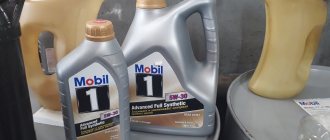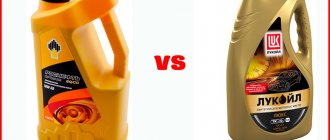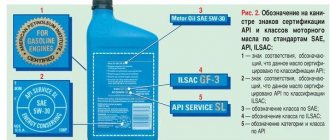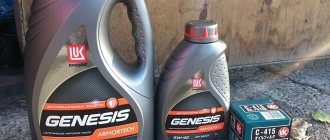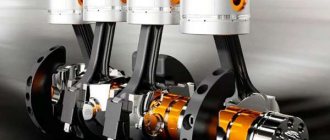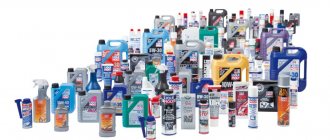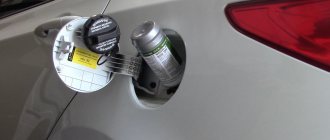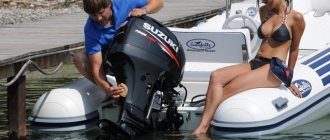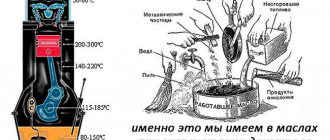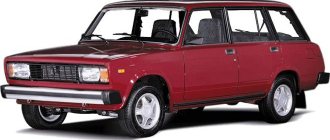Motul 8100 X-cess 5W40
Synthetic, for 4-stroke engines. Can be used in turbocharged engines. API class – SN (the latest adopted standard, approved in 2010). Approved for use in both gasoline and diesel engines.
Pros:
- synthetic oil;
- suitable for turbocharged engines (where heat dissipation is an order of magnitude higher than that of conventional engines);
- does not change viscosity after 2 years of active use (according to customer statements).
Minuses:
- This particular brand is often counterfeited (therefore you should only buy from official representatives);
- Other engines with turbines consume a lot of oil..
ZIC X9 5W-40
Synthetic oil produced with an emphasis on Low Saps technology (reduced content of sulfur, phosphorus, ash, thereby minimizing the occurrence of sediment and deposits). Suitable for gasoline and diesel 4-stroke engines, but not compatible with turbocharged ones (although, according to reviews, it works fine in such engines). API class – SN.
Pros:
- low cost (as for synthetic oil);
- easy engine starting in winter at -20 degrees;
- the motor runs quietly.
Minuses:
- high consumption (especially when operating the engine at high speeds);
- difficult to check for originality: the manufacturer often changes the packaging.
Top 5 synthetic motor oils 5w40
Liqui Moly Synthoil High Tech
The rating of 5w40 synthetic motor oils is closed by a German technical fluid, which is highly popular in the European market. Its main tasks include not only effective protection of parts from wear, but also improvement of the operational and power properties of propulsion systems. The products are intended for multi-valve power plants equipped with turbocharging.
Advantages:
Liqui Moly Synthoil High Tech 5W-40
- Increased protection of structural elements from wear and oxidation processes.
- Possibility of mixing the liquid with standard motor oils of the same viscosity.
- "Clean" exhausts. The synthetic lubricant contains no environmentally harmful impurities.
Flaws:
- Relatively high cost.
- There is a high risk of purchasing a counterfeit product.
- According to reviews from car enthusiasts, oil is quickly consumed under intense engine operating conditions. It was this drawback that did not allow us to top the list of the best synthetic motor oils.
Price:
- 1 liter - 700-900 rubles.
- 4 liters - 2,600-3,500 rubles.
- 20 liters - 12,800-13,600 rubles.
Tolerances and specifications:
- API: CF and SM
- ACEA A3/B4
- BMW: Longlife98
- MB: 229.3
- Porsche: A40
- VW: 502.00/505.00
Lukoil Lux
The rating of 5w40 motor oils, characterized by high consumer properties, includes domestic products. Moreover, the Lux series oil belongs to the premium class. It has received approval from leading automobile concerns - Renault, Volkswagen and BMW.
Lukoil Lux has a completely synthetic base; it is suitable for a gasoline or diesel engine that does not have particulate filters, but is equipped with a turbocharger.
Advantages:
Lukoil Lux
- Climate resilience. Because The oil was developed and tested in Russian winter conditions; it ideally maintains performance characteristics in any temperature changes. Due to the rapid distribution of fuel and lubricant on a cold engine, the car starts as usual even in the most severe frost.
- Stable viscosity and a functional additive package make it possible to provide high protection against friction forces for any driving style: from calm to aggressive.
- Effectively cleans the working area of sludge and contaminants, does not form soot and deposits.
- Sold in almost all auto stores.
Lukoil products have one significant drawback that prevents them from gaining the title of “the best oil” - the high sulfur content in its composition. Such an ingredient releases a stream of harmful exhaust into the atmosphere, which significantly reduces the environmental class of the product.
Price:
- 1 liter - 300-400 rubles.
- 4 liters - 1,000-1,300 rubles.
- 18 liters - 5,200-6,200 rubles.
Tolerances and specifications:
- API CF, SN
- ACEA A3/B4
- PSA B71 2296
- FIAT 9.55535-N2, 9.55535-Z2
- MB-Approval 229.5
- Renault RN 0700 / 0710
- JSC "AVTOVAZ"
- VW 502 00 / 505 00
Xenum X1 Ester Hybrid Synthetic
The top three in the “Best 5w40 synthetic motor oil” rating starts with Belgian automotive products. Ester hybrid synthetic technical fluid is intended for gasoline and diesel power plants that meet the following requirements:
- engine environmental standard - EURO IV/V,
- there is a DPF fine filter and a NOx storage catalyst, as well as other systems that purify exhaust gases.
Advantages:
Xenum X1 Ester Hybrid Synthetic
- The oil is produced on an ester base, which allows maintaining the stability of the protective layer for a long time under conditions of increased operational overload. The oil does not lose viscosity at high or low temperatures.
- The product contains low levels of sulfur, phosphorus and sulphate, which makes exhaust gases absolutely harmless to the environment.
- Increased fuel economy. Thanks to the balanced and stable operation of the propulsion system, filled with high-quality synthetics, the mechanisms interact with minimal losses and optimal load. This measure allows the power plant to moderately consume the fuel mixture and significantly save the car enthusiast’s personal funds.
Flaws:
- The oil in this line is sold only in specialized stores, so getting it can sometimes be quite difficult.
- Unfortunately, there is a high risk of running into a fake. Therefore, before purchasing oil, you must carefully inspect its canister.
- If the oil is selected incorrectly, rapid evaporation may occur. Therefore, before pouring it under the hood, you need to familiarize yourself with the tolerances.
Price:
- 1 liter - 600-700 rubles.
- 5 liters - 2,900-4,000 rubles.
- 60 liters - 27,000-29,000 rubles.
Tolerances and specifications:
- ACEA C3-12, A3/B4-04
- API SN/CF
- VW 502.00/505.00/505.01
- MB 229.31/226.5
- BMW Longlife-04
- Ford M2C917-A
- Porsche A40
- Renault RN0700/RN0710
- Dexos 2
Shell Helix Ultra Synthetic
Second place in the rating of 5w40 synthetic oils is occupied by high-quality synthetics from Shell. The technical fluid is developed using patented technology, so it functions smoothly under excessive motor overloads.
Advantages:
Shell Helix Ultra 5W-40
- Effective cleaning of the working area from carbon deposits and dirt.
- Low volatility. Even at elevated temperatures, the liquid retains its consumer properties and does not transform into steam.
- Versatility. The lubricant perfectly adapts to gasoline and diesel power plants, improves their power characteristics and protects parts from premature wear.
- Noise reduction. Among all synthetic oils, Shell Helix Ultra Synthetic is more effective in reducing operating noise in the engine compartment. Penetrating between the gaps of body elements, the oil fills all the necessary space and eliminates structural vibration.
Flaws:
- Despite the fact that the oil proves its well-deserved position in the ranking in all respects, it has a small, but not the most pleasant, flaw. An independent examination has shown that the oil does not always cope with the low-temperature conditions declared by the manufacturer. The limit for him is not the indicated 35 degrees of frost, but 20-25. Therefore, the use of the liquid in areas exposed to harsh winter conditions is not advisable.
- Shell Helix Ultra Synthetic oil is not suitable for TFSI engines.
Price:
- 1 liter – 500-700 rub.
- 4 liters – 1700-2740 rubles.
- 20 liters – 8,000-9,200 rub.
Tolerances and specifications:
- API SN/CF;
- ACEA A3/B3, A3/B4;
- MB 229.3;
- VW 502.00/505.00;
- Renault RN0700, RN0710.
Eneos Gran-Touring
In first place in the rating of “Best synthetic motor oils 5w40” was a Japanese oil intended for multi-valve gasoline engines that are subject to heavy overloads and are equipped with a turbocharger and intercooler.
Advantages:
Eneos Gran-Touring 5W-40
- Maximum reduction of friction force, increase in engine power and increase in its service life due to a multifunctional additive package containing molybdenum disulfide.
- High resistance to aging, oxidation and deposit formation.
- Fuel savings – up to 5%.
- Stable start of a cold engine.
Japanese synthetics of this brand are quite rare in car shops, and this is its main drawback.
Price:
- 0.94 liters – 500-550 rubles.
- 4 liters – 1600-1800 rubles.
- 20 liters – 6,500-7,000 rubles.
Tolerances and specifications:
- API SM
- ACEA A3
Castrol Magnatec 5W-40 A3/B4
Synthetic oil compatible with diesel and carburetor engines. API class – SN/CF. Produced using Intelligent Molecules technology. According to the manufacturer, this will improve the adhesion of the oil to the metal elements of the engine by 40%, providing stronger protection against wear.
Pros:
- excellent washing characteristics;
- maintains viscosity at a temperature of -25 degrees.
Minuses:
- the composition includes additives that produce waste;
- often have to be changed (after 7.5 thousand kilometers the oil becomes dark).
Parameters used for testing
Lubricants from various manufacturers poured into the engine undergo thorough examination in modern laboratory conditions. The rating of the best motor oils is based on a comparison of the following main characteristics:
- Lubricant viscosity.
- Consumption of lubricating fluid due to waste.
- Resistance against oxidative processes when exposed to high temperatures.
- Alkaline index.
- Ecological qualities.
- Anti-wear characteristics.
Comparisons of 5w40 synthetic lubricants produced by various manufacturers are carried out according to mandatory parameters in independent laboratories, testing conditions are equal.
The data obtained allows us to determine the best motor oil and create a rating of lubricants.
Viscosity requirements
The fluidity of a substance (viscosity) is the property of a lubricating fluid to penetrate hard-to-reach places in the parts and components of the power unit to ensure their lubrication. The value of this parameter also indicates the preservation of the useful properties of the material during temperature fluctuations in a certain range.
The SAE 5w 40 standard guarantees stable movement of oil through the lubrication system, reliable protection of the working elements of the internal combustion engine and stable cold starting at temperatures from minus 30°C to plus 45°C.
Oil consumption for waste
5w40 synthetics are capable of creating protective films on the surfaces of power unit parts, which evaporate when the operating engine heats up, leading to loss of lubricant.
The danger of engine oil starvation occurs when the oil level drops below o (minimum) on the dipstick. The tested oil substances are checked for the amount of waste.
Resistance against oxidative influences
Synthetic lubricants are resistant to the formation of acids and resins when exposed to high temperatures. This useful property makes it possible to avoid the formation of deposits and carbon deposits in large quantities.
Alkalinity index
The alkaline index characterizes the amount of specialized additives included in the motor oil in addition to the base. Additives give lubricants improved properties necessary to reduce and slow down the wear of parts and components of the power unit.
Environmental friendliness of motor oil
The more elements of sulfur and phosphorus are in the lubricating fluid, the more harm this substance causes to the environment. To reduce the destructive effects on nature, modern standards require a reduction in the amount of these chemical compounds in motor oils.
ELF Evolution 900 NF 5W-40
Synthetic, compatible with carburetor and diesel engines. API class - SL (standard for cars produced in 2000 - 2004). Not suitable for turbocharged engines, although it can be used in engines with a higher speed range. According to the EFL, it can be used in racing cars. Suitable for many car engines.
Pros:
- replacement interval - over 13 thousand kilometers;
- low cost (as for full synthetics);
- retains initial viscosity in severe frosts.
Minuses:
- no protection against counterfeiting;
- in some motors it provokes periodic vibrations (and the sound of operation changes).
What do we control?
We will judge the patient’s health by changes in basic physical and chemical parameters. This is the dynamics of changes in oil viscosity at different temperatures, alkaline and acid numbers, as well as flash point. The scale is two-level, like “alive - dead”. For example, we consider dead oil the viscosity of which is outside the limits prescribed by the SAE class. In our case, the permissible viscosity range is 12.5...16.3 cSt. A drop in the base number by more than two times from the initial value is a generally accepted rejection parameter; we will also accept it as a conditional criterion for the death of the oil. Another criterion (we have not yet rejected any oil based on it) is the so-called loss of the additive package, which indicates the complete unsuitability of the oil. It is characterized by a sharp (at least threefold) decrease in the concentration of active elements in the oil - zinc, barium, phosphorus - in relation to the initial amount.
As usual, let's check the level of deposits that the oil produces during operation. To do this, let’s estimate their number and color on the side surfaces of the pistons (the so-called analogue of the EPV method). A completely white piston is zero points, an all black piston is six points. Intermediate gradations have their own scores in this interval. All this refers to the so-called high-temperature deposits. And we will evaluate the low-temperature ones quantitatively by weighing the main dirt collectors before and after the tests - the oil pump intake fungus, as well as the oil separator mesh from the valve cover. An increase in the mass of parts will indicate the “degree of sloppiness” of the oil.
The engine wear parameters after the test cycle will help evaluate changes in the protective functions of the oil when operating in the “highway” and “traffic jam” cycles. They can be determined by the content of the main wear products in the oil (for us, the indicator was the presence of iron in it), by accurately weighing the piston rings and crankshaft bearing shells before and after testing.
LIQUI MOLY Optimal Synth 5W-40
Semi-synthetic for carburetor and diesel (without particulate filters) engines. API class – SN. According to reviews: consumption is 30% less compared to mineral oils from Liqui Moly. The manufacturer states that the oil is allowed to be used at a temperature of -30 degrees (while maintaining viscosity).
Pros:
- the engine starts easily in severe frost;
- cleans well of deposits;
- contains molybdenum disulfide (improves corrosion protection).
Minuses:
- high price;
- often counterfeited.
Characteristics of 5W30 and 5w40 engine oil
The demand for motor oils of this series for gasoline and diesel engines is due to the universal performance characteristics of such technical fluids. Let's pay attention only to the main points:
- 5W30 are mainly synthetic or semi-synthetic motor oils, but mineral-based formulations are also available, used for power units of passenger cars, commercial vehicles, and SUVs.
It has good lubricating characteristics at ambient temperatures ranging from -25 to +30 degrees.
The composition may vary depending on the manufacturers, who add their own additives to the base to help remove carbon deposits and neutralize aggressive substances formed during fuel combustion.
- 5w40 is an all-season motor oil, which has a composition similar to the previous series. The main difference is the expanded temperature range, which significantly increases the scope of application. Oil of this class remains effective at ambient temperatures up to +35 degrees. It is most widely used in the southern regions of the country.
Both types of oils are widely used throughout Russia, with the exception of regions with harsh winter climates, for which it is recommended to choose specialized technical fluids that do not lose their performance characteristics in extreme frosts.
IDEMITSU Zepro Euro Spec 5W-40
Synthetic for all 4-stroke engines. API class – SN. In production, additives are used to prevent rupture of the protective film covering the engine components from the inside. But, judging by the reviews, they also provoke the occurrence of burning after 7 - 7.5 thousand kilometers of operation.
Pros:
- the engine runs very quietly;
- compatible with Asian cars.
Minuses:
- high consumption;
- sediment appears in the crankcase at 10 thousand kilometers.
TOTAL Quartz 9000 5W40
Synthetic oil for all four-stroke engines, including turbocharged ones. API class - SN. Meets the Euro 4 safety standard. Energy saving, that is, better suited for use in the cold season. Reduces fuel consumption by up to 8%.
Pros:
- ideal for cold regions;
- the manufacturer indicates compatibility when using natural gas as a fuel.
Minuses:
- does not remove carbon deposits well on old engines (that have traveled more than 200 thousand kilometers);
- not suitable for mixing with other oils (separation is noticeable).
The best semi-synthetic motor oils for gasoline engines
Semi-synthetic is an oil that gets a lot of attention. But with its help you can combine all the advantages of mineral water and fully synthesized lubricants. The current rating includes the following motor oils from the semi-synthetic category:
- LIQUI MOLY Top Tec 4200 5W-30—compositions using titanium are used as the main additive. Thanks to this, it is possible to form a durable protective film on the internal surfaces of the engine. Due to this, an increase in the working life of the power unit is ensured. In addition, the oil of this series is highly resistant to burnout; the level drop in an internal combustion engine under normal operating conditions is minimal. It is possible to combine it with lubricants from other manufacturers, but the maximum effect is observed only when using original formulations.
- Shell Helix HX7 5W-30 - this composition managed to combine all the advantages of mineral water and synthetics. Suitable for engines running on any type of fuel, does not lose its performance characteristics in various climatic conditions, and can be used throughout Russia.
Low viscosity coefficient, ability to provide starting in cold mode.
Improved performance in protecting the internal surfaces of the power unit from corrosion, and the ability to clean carbon deposits.
- LK-SUPER-5W40 is a good cost option from the Russian one. It is practically in no way inferior to imported analogues and maintains viscosity parameters under different temperature conditions. Provides regulated lubricating properties at any ambient temperature.
The service life is somewhat shorter compared to imported analogues from the premium price segment, but given the ratio of cost and quality, this indicator is quite acceptable.
- Maximum 5W-40 is another Russian representative (Rosneft) in the current rating. It features enhanced anti-wear characteristics. The oil is able to withstand critical operating conditions even under particularly difficult operating conditions of the vehicle. Helps remove carbon deposits, according to the API classification it corresponds to the SG/CD category.
Note that the composition was originally developed for use in conditions typical of the Russian Federation and other CIS countries.
- Gazpromneft Super 5w-40 - this oil is more suitable for use in cars whose engines have already accumulated considerable mileage. It will do an excellent job of maintaining the working life and ensure starting in cold weather. You shouldn’t expect any special protective performance from him, but he copes with his tasks at a very high level.
As you can see, most of the semi-synthetics are represented by Russian products. Yes, there is a choice among American and European motor oils, but, with comparable quality, they significantly lose in price.
SHELL Helix HX8 Synthetic 5W-40
Synthetic, compatible with any engines, including turbocharged ones. Universal and suitable for the fuel used (ethyl-enriched gasoline, biofuels are also suitable). API class – SN. Meets SN Plus standards (the most modern today). It is considered one of the best in its price category.
Pros:
- suitable for most European and American cars;
- SN Plus standard.
Minuses:
- after 10 - 12 thousand kilometers, the properties sharply deteriorate (viscosity increases);
- high risk of purchasing a fake.
LUKOIL Genesis Armortech 5W-40
Synthetics, for all variations of 4-stroke engines, compatible when using natural gas. API class – SN. Suitable for use at temperatures of -35 degrees, maintaining the initial viscosity. The manufacturer states that “aggressive” additives are not used in production.
Pros:
- low cost;
- permissible wide temperature range for use;
- there is a permit from Opel (the concern is quite strict in terms of issuing permits).
Minuses:
- have to be changed frequently (after 8 thousand kilometers);
- leaves a fume.
